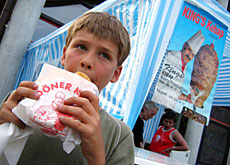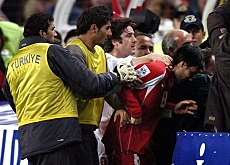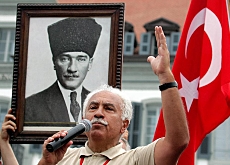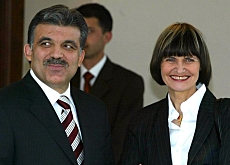A colourful diplomatic year comes to an end
swissinfo: The end of 2005 marks the end of your first year as Turkish ambassador to Switzerland. What has the year been like for you personally?
Ankara’s ambassador to Bern, Alev Kiliç, looks back on a difficult year for Swiss-Turkish relations and gives swissinfo an update on their current state of health.
Low points in 2005 were the worsening of a diplomatic spat and a punch-up between players after Switzerland knocked Turkey out of the football World Cup.
In March Swiss Foreign Minister Micheline Calmy-Rey visited Turkey and raised the sensitive issue of the massacre of Armenians in Turkey early last century.
In June the Swiss public prosecutor launched a criminal investigation against a Turkish historian in Switzerland who had denied the genocide, a violation of Switzerland’s anti-racism laws.
The following month Turkey’s foreign minister, Abdullah Gül, described the Swiss investigation as “unacceptable” and “absolutely contrary to the principle of free speech”.
In August the Turkish authorities postponed a visit by Swiss Economics Minister Joseph Deiss citing agenda problems of his Turkish counterpart.
In November Switzerland beat Turkey in a vital World Cup playoff match, triggering ugly scenes between players. Fifa’s Swiss president, Sepp Blatter, said sanctions against Turkey could amount to the suspension of the Turkish federation or a ban from the 2010 World Cup.
Alev Kiliç: It has been a very interesting and rewarding year for me. Switzerland is unique in terms of its establishment and the formation of its institutions. It does not correspond to any other neighbouring, or for that matter European, country so one has to learn how things work here and that’s a challenge. But once one grasps that knowledge it’s business as usual.
swissinfo: Have you noticed a Swiss way of living? A Swissness?
A.K.: Yes, Switzerland is a country of its own values. The Swissness is, as the Swiss themselves say, not one of a common nationality but of a common future, common endeavours and common interests.
swissinfo: 2005 has been a particularly challenging year for Swiss-Turkish relations –Armenia, Deiss’s cancelled trip to Ankara, the football match… Are Swiss-Turkish relations worse today than on January 1?
A.K.: My answer would be no. Yes, this has been a challenging year, but the Armenian issue is not something new. It has been under the surface for decades and, if I can correct you, Mr Deiss’s visit has been postponed, not cancelled.
And as for the football game, the consequences were unnecessary for both sides but I stick to my first assessment on the issue: a football game is a football game and it should not go beyond its dimensions. It certainly will not undermine official business but I’m more worried about its impact on the public.
swissinfo: How do you think the Swiss and Turkish public see each other?
A.K.: The Turkish public has always had great esteem for Switzerland and the Swiss people and I do not think that things have changed for the negative on that despite some of these fluctuations.
However, at least from the Turkish side, there is a growing acknowledgement that it is not reciprocal – and so this is why I see part of my job here to establish this reciprocity.
swissinfo: How would you describe the current health of Swiss-Turkish relations?
A.K.: We were friends, we are friends and we will be friends, but friendship also needs tending in some instances. We are currently going through such a phase in which we should be taking care of this friendship better.
swissinfo: What are the biggest dates in your diary for 2006?
A.K.: Prime Minister Erdoğan is expected to visit Davos in January to take part in the World Economic Forum meetings – as he has for the past three years – and I hope this will give a further impetus to bilateral relations as he and his entourage meet their Swiss counterparts.
But I would also say that Turkish-Swiss relations are not just confined to high-level visits and official contacts, they are multifaceted – from culture to economy to sports to whatever.
Switzerland, although not an EU member, is at the core of Europe. It is an inseparable part of Europe and as such Turkish-Swiss relations are bound to deepen every passing year. I hope 2006 will provide a fertile ground in that direction.
swissinfo-interview: Thomas Stephens
There are 80,000 Turks living in Switzerland and 6,000 people with Armenian roots.
In 2004, Swiss exports to Turkey were worth SFr1.9 billion ($1.45 billion), 17% more than in 2003.
Among Swiss firms established in Turkey are Novartis, Nestlé, ABB, Ciba, Roche, Givaudan and Syngenta.
Armenians say between 800,000 and 1.8 million of their people were killed or deported by the Ottoman Empire from 1915-18.
Turkey disputes this, putting the figure closer to 200,000 and saying there were killings on both sides.
The historical interpretation of the deaths has caused tensions between Turkey and many European countries.

In compliance with the JTI standards
More: SWI swissinfo.ch certified by the Journalism Trust Initiative





You can find an overview of ongoing debates with our journalists here. Please join us!
If you want to start a conversation about a topic raised in this article or want to report factual errors, email us at english@swissinfo.ch.